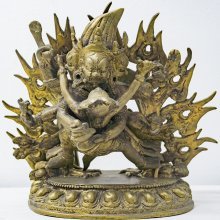Nirvana, Nirvāṇa, Nirvaṇa, Nir-vana: 27 definitions
Introduction:
Nirvana means something in Buddhism, Pali, Hinduism, Sanskrit, the history of ancient India, Marathi, Hindi. If you want to know the exact meaning, history, etymology or English translation of this term then check out the descriptions on this page. Add your comment or reference to a book if you want to contribute to this summary article.
Alternative spellings of this word include Nirvan.
Images (photo gallery)
(+8 more images available)
In Hinduism
Purana and Itihasa (epic history)
Source: Cologne Digital Sanskrit Dictionaries: The Purana IndexNirvāṇa (निर्वाण).—Is mokṣa;1 gained by doing the vibhūtīdvādaśivrata on the Ganges;2 Prahlāda blessed with Nirvāṇa;3 of Śatānīka;4 Mucukunda's request to Kṛṣṇa for Nirvāṇa.5
- 1) Bhāgavata-purāṇa III. 25. 28-29; VI. 4. 28; IX. 7. 27; Brahmāṇḍa-purāṇa III. 56. 10. Viṣṇu-purāṇa I. 20. 28 and 34; II. 8. 119; III. 18. 17; 8. 6.
- 2) Matsya-purāṇa 100. 33.
- 3) Viṣṇu-purāṇa I. 19. 46.
- 4) Ib. IV. 21. 4.
- 5) Ib. V. 23. 47; VI. 7. 21. 2.

The Purana (पुराण, purāṇas) refers to Sanskrit literature preserving ancient India’s vast cultural history, including historical legends, religious ceremonies, various arts and sciences. The eighteen mahapuranas total over 400,000 shlokas (metrical couplets) and date to at least several centuries BCE.
Vaishnavism (Vaishava dharma)
Source: Pure Bhakti: Brhad BhagavatamrtamNirvāṇa (निर्वाण) refers to:—Extinction of existence; liberation from the suffering of material existence. (cf. Glossary page from Śrī Bṛhad-bhāgavatāmṛta).

Vaishnava (वैष्णव, vaiṣṇava) or vaishnavism (vaiṣṇavism) represents a tradition of Hinduism worshipping Vishnu as the supreme Lord. Similar to the Shaktism and Shaivism traditions, Vaishnavism also developed as an individual movement, famous for its exposition of the dashavatara (‘ten avatars of Vishnu’).
Shaktism (Shakta philosophy)
Source: Google Books: ManthanabhairavatantramNirvāṇa (निर्वाण) is the name of the Cave associated with Jālandhara, one of the sacred seats (pīṭha), according to the Ṣaṭsāhasrasaṃhitā, an expansion of the Kubjikāmatatantra: the earliest popular and most authoritative Tantra of the Kubjikā cult.—On the basis of hardly more than a hint in the Ṣaṭsāhasrasaṃhitā, it outlines a scheme of sixteen parts for each seat, conscious, no doubt, that this is an ideal number. The commentary normally limits itself to do no more than explain what is presented in the text. This is one of the few instances it adds substantially to its contents [i.e., the Caves—Nirvāṇa]. Presumably this is because when it was written the presentation of the features of the seats on this model was the accepted norm.

Shakta (शाक्त, śākta) or Shaktism (śāktism) represents a tradition of Hinduism where the Goddess (Devi) is revered and worshipped. Shakta literature includes a range of scriptures, including various Agamas and Tantras, although its roots may be traced back to the Vedas.
Yoga (school of philosophy)
Source: ORA: Amanaska (king of all yogas): A Critical Edition and Annotated Translation by Jason BirchNirvāṇa (निर्वाण) refers to “cessation” (which is intrinsically inherent in the mind), according to the Amanaska Yoga treatise dealing with meditation, absorption, yogic powers and liberation.—Accordingly, as Īśvara says to Vāmadeva: “[...] [Now], I shall define the nature of that highest, mind-free absorption which arises for those devoted to constant practice. [...] Just as the salty taste intrinsically inherent [in salt,] is effortlessly obtained from a salty substance, so gnosis of Brahma [in the form of] cessation (nirvāṇa) [which is intrinsically inherent in the mind] is effortlessly [obtained] from the mind. [...]”.

Yoga is originally considered a branch of Hindu philosophy (astika), but both ancient and modern Yoga combine the physical, mental and spiritual. Yoga teaches various physical techniques also known as āsanas (postures), used for various purposes (eg., meditation, contemplation, relaxation).
General definition (in Hinduism)
Source: WikiPedia: HinduismNirvāṇa is a term used in Hinduism, Jainism, Buddhism, and Sikhism. It leads to mokṣa, liberation from samsara, or release from a state of suffering, after an often lengthy period of bhāvanā or sādhanā.
In Jainism, mokṣa (liberation) follows nirvāṇa. Nirvana means final release from the karmic bondage. An arhat becomes a siddha ("one who is accomplished") after nirvāṇa. When an enlightened human, such as an arihant or a Tirthankara, extinguishes his remaining aghatiya karmas and thus ends his worldly existence, it is called nirvāṇa. Jains celebrate Diwali as the day of nirvāṇa of Mahavira.
In the Buddhist tradition, nirvana is described as the extinguishing of the fires that cause suffering. These fires are typically identified as the fires of attachment (raga), aversion (dveṣa) and ignorance (moha or avidya). When the fires are extinguished, suffering (dukkha) comes to an end. The cessation of suffering is described as complete peace.
Hinduism: According to Zaehner and "many commentators", nirvana is a Buddhist term rather than a Hindu term. The term nirvana was not used in Hinduism prior to its use in the Bhagavad Gita, though according to van Buitenen the use of the term was not confined to Buddhism at the time the Bhagavad Gita was written. According to Johnson the use of the term nirvana is borrowed from the Buddhists to link the Buddhist state of liberation with Brahman, the supreme or absolute principle of the Upaniṣads and the Vedic tradition.
In Buddhism
Theravada (major branch of Buddhism)
Source: Dhamma Study: CetasikasPeace; Nibbana is the unconditioned dhamma, visankhara dhamma or asankhata dhamma; it does not arise and fall away. Nibbana is the object of the supramundane citta, lokuttara citta, arising at the moment of enlightenment.
Theravāda is a major branch of Buddhism having the the Pali canon (tipitaka) as their canonical literature, which includes the vinaya-pitaka (monastic rules), the sutta-pitaka (Buddhist sermons) and the abhidhamma-pitaka (philosophy and psychology).
Mahayana (major branch of Buddhism)
Source: Wisdom Library: Maha Prajnaparamita SastraNirvāṇa (निर्वाण) refers to “deliverance”, according to the 2nd century Mahāprajñāpāramitāśāstra chapter XLVIII. Accordingly, “the path of nirvāṇa is a path of deliverance, of detachment in regard to the threefold world, of renunciation of the five objects of sensory enjoyment, of the taste of the trances and absorptions felt in the material world, the world of form and the formless world. This detachment follows a pure wisdom which cannot be acquired without the support of samādhi”.
Source: academia.edu: A Study and Translation of the GaganagañjaparipṛcchāNirvāṇa (निर्वाण) refers to “extinction”, according to the Gaganagañjaparipṛcchā: the eighth chapter of the Mahāsaṃnipāta (a collection of Mahāyāna Buddhist Sūtras).—Accordingly, “[...] The Bodhisattva Gaganagañja then sustained the jewel-canopy of ten thousand yojanas high over the Lord’s lion throne in the sky, joined the palms of his hands, saluted, and praised the Lord with these suitable verses: ‘[...] (16) Even though living beings nowhere and never exist, as does not extinct (nirvāṇa), even though there is nothing for living beings to achieve since they are originally pure (ādiviśuddhi), the Buddha still awakens koṭis of living beings, having himself become awakened to the understanding that living beings have the character of an illusion (māyā). [...]”.

Mahayana (महायान, mahāyāna) is a major branch of Buddhism focusing on the path of a Bodhisattva (spiritual aspirants/ enlightened beings). Extant literature is vast and primarely composed in the Sanskrit language. There are many sūtras of which some of the earliest are the various Prajñāpāramitā sūtras.
General definition (in Buddhism)
Source: Wisdom Library: BuddhismNirvana:—The attainment of enlightenment. When you become enlightened you no longer suffer while living in the world and that is the real nirvana taught by the Buddha.
Source: Buddhist Door: GlossaryNirvana is a Sanskrit word which is originally translated as "perfect stillness". It has many other meanings, such as liberation, eternal bliss, tranquil extinction, extinction of individual existence, unconditioned, no rebirth, calm joy, etc. It is usually described as transmigration to "extinction", but the meaning given to "extinction" varies. There are four kinds of Nirvana: 1. Nirvana of pure, clear self nature 2. Nirvana with residue 3. Nirvana without residue 4. Nirvana of no dwelling Source: Shambala Publications: GeneralNirvāna Skt., lit., “extinction” (Pali, nibbāna; Jap., nehan); the goal of spiritual practice in all branches of Buddhism. In the understanding of early Buddhism, it is departure from the cycle of rebirths (samsāra) and entry into an entirely different mode of existence. It requires complete overcoming of the three unwholesome roots—desire, hatred, and delusion, and the coming to rest of active volition. It means freedom from the determining effect of karma. Nirvāna is unconditioned (asamskrita); its characteristic mark is the absence of arising, subsisting, changing, and passing away.
In Hīnayāna two types of nirvāna are distinguished: nirvāna with a remainder of conditionality, which can be attained before death; and nirvāna without conditionality, which is attained at death.
In Mahāyāna, the notion of nirvāna undergoes a change that may be attributed to the introduction of the bodhisattva ideal and an emphasis on the unified nature of the world. Nirvāna is conceived as oneness with the absolute, the unity of samsāra and transcendence. It is also described as dwelling in the experience of the absolute, bliss in cognizing one’s identity with the absolute, and as freedom from attachment to illusions, affects, and desires.
In the West nirvāna has often been misunderstood as mere annihilation; even in early Buddhism it was not so conceived. In many texts, to explain what is described as nirvāna, the simile of extinguishing a flame is used. The fire that goes out does not pass away, but merely becomes invisible by passing into space; thus the term nirvāna does not indicate annihilation but rather entry into another mode of existence. The fire comes forth from space and returns back into it; thus nirvāna is a spiritual event that takes place in time but is also, in an unmanifest and imperishable sphere, always already there. This is the “abode of immortality,” which is not spatially localizable, but is rather transcendent, supramundane, and only accessible to mystical experience. Thus in early Buddhism, nirvāna is not seen in a positive relation to the world but is only a place of salvation.
In some places in the sūtras an expression is used for nirvāna that means “bliss,” but far more often nirvāna is characterized merely as a process or state of cessation of suffering (duhkha). This should not, however, be regarded as proof of a nihilistic attitude; it is rather an indication of the inadequacy of words to represent the nature of nirvāna, which is beyond speech and thought, in a positive manner. As a positive statement concerning nirvāna, only an indication concerning its not being nothing is possible. For Buddhism, which sees all of existence as ridden with suffering, nirvāna interpreted as the cessation of suffering suffices as a goal for the spiritual effort; for spiritual practice it is irrelevant whether nirvāna is a positive state or mere annihilation. For this reason the Buddha declined to make any statement concerning the nature of nirvāna.
Source: DLMBS: Buddhānusmṛtinirvāṇa [nibbāna] emancipation. Nirvāṇa, the summum bonum of Buddhism is an unconditioned dharma (asaṃskṛta dharma). 'Nir' is a negative particle. 'Vā' means to blow. The word nirvāṇa means extinction, the condition of being blown out; the state in which the fire (of defilements) has been extinguished. The primitive Buddhist Sūtra-s define nirvāṇa as the extinction of greed, anger and ignorance. One of the etymologies of nirvāṇa is given as 'no forest' (nir-vana), that is, absence of the jungle of defilements.
The four aspects of nirvāṇa are
- nirvāṇa with residue (sopādhiśeṣa nirvāṇa),
- nirvāṇa without residue (anupādhiśeṣa nirvāṇa or nirupādhiśeṣa nirvāṇa or parinirvāṇa),
- the primeval nirvāṇa (svabhāva nirvāṇa),
- non-abiding nirvāṇa (apratiṣṭhita nirvāṇa).
Nirvāṇa with residue means freedom from defilements and from future births. After attaining this nirvāṇa the physical body in the present birth still exists as a result of past karma. It is called sopādhiśeṣa nirvāṇa because the groups of existence -- mind and body (upādhi) -- still remain. This aspect is attained by an Arhat during his life.
India history and geography
Source: Cologne Digital Sanskrit Dictionaries: Indian Epigraphical GlossaryNirvāṇa.—(CII 3), annihilation of human passion; a stage in the Buddhist practices, anterior to parinirvāṇa or complete annihilation of personal existence by absorption into the all- pervading spirit. (HA), same as mokṣa; liberation from all bondage includ- ing that of this earthly body; the death of the Jinas or monks who have obtained kevala-jñāna. Note: nirvāṇa is defined in the “Indian epigraphical glossary” as it can be found on ancient inscriptions commonly written in Sanskrit, Prakrit or Dravidian languages.

The history of India traces the identification of countries, villages, towns and other regions of India, as well as mythology, zoology, royal dynasties, rulers, tribes, local festivities and traditions and regional languages. Ancient India enjoyed religious freedom and encourages the path of Dharma, a concept common to Buddhism, Hinduism, and Jainism.
Languages of India and abroad
Marathi-English dictionary
Source: DDSA: The Molesworth Marathi and English Dictionarynirvāṇa (निर्वाण).—n (S) Extremity or extreme distress; the state of one reduced to his last resource. 2 fig. Death. 3 The ultimatum of man,--emancipation from matter and reunion with the Deity. ni0 karaṇēṃ To do to extremity or the utmost; to carry to excess or to its farthest bounds. Ex. parakāraṇī vēcilē prāṇa || ēkādaśī kēlī ni0 ॥.
--- OR ---
nirvāṇa (निर्वाण).—a S Departed, utterly gone, lit. fig.; e. g. defunct or dead; emancipated from matter or from distinct existence; extinguished or gone out; gone down or set--a heavenly body. 2 Refraining, desisting, ceasing from. 3 Used for nirvāṇacā q. v. infra.
Marathi is an Indo-European language having over 70 million native speakers people in (predominantly) Maharashtra India. Marathi, like many other Indo-Aryan languages, evolved from early forms of Prakrit, which itself is a subset of Sanskrit, one of the most ancient languages of the world.
Sanskrit dictionary
Source: DDSA: The practical Sanskrit-English dictionaryNirvāṇa (निर्वाण).—p. p.
1) Blown or put out, extinguished (as a lamp or fire); निर्वाणवैरदहनाः प्रशमादरीणाम् (nirvāṇavairadahanāḥ praśamādarīṇām) Ve.1.7; Kumārasambhava 2.23.
2) Lost, disappeared.
3) Dead, deceased.
4) Liberated from existence.
5) Set (as the sun).
6) Calmed, quieted.
7) Plunged.
-ṇam 1 Extinction; अपि निर्वाणमायाति नानलो याति शीतताम् (api nirvāṇamāyāti nānalo yāti śītatām) H.1.131; शनैर्निर्वाणमाप्नोति निरिन्धन इवानलः (śanairnirvāṇamāpnoti nirindhana ivānalaḥ) Mb.
2) Vanishing from sight, disappearance.
3) Dissolution, death.
4) Final liberation or emancipation from matter and reunion with the Supreme Spirit, eternal bliss; निर्वाणं नाधिगच्छेयुर्जीवेयुः पशु- जीविकाम् (nirvāṇaṃ nādhigaccheyurjīveyuḥ paśu- jīvikām) Mahābhārata (Bombay) 3.31,26; निर्वाणमपि मन्येऽहमन्तरायं जयश्रियः (nirvāṇamapi manye'hamantarāyaṃ jayaśriyaḥ) Kirātārjunīya 11.69; R.12.1.
5) (With Buddhists) Absolute extinction or annihilation, complete extinction of individual or worldly existence.
6) Perfect and perpetual calm, repose; निर्वाणं समुपगमेन यच्छते ते (nirvāṇaṃ samupagamena yacchate te) (namaḥ) Kirātārjunīya 18.39.
7) Complete satisfaction or pleasure, supreme bliss, highest felicity; स योगी ब्रह्मनिर्वाणं ब्रह्मभूतोऽधिगच्छति (sa yogī brahmanirvāṇaṃ brahmabhūto'dhigacchati) Bhagavadgītā (Bombay) 5.24; अये लब्धं नेत्रनिर्वाणम् (aye labdhaṃ netranirvāṇam) Ś.3; M.3.1; Śiśupālavadha 4.23; V.3.21.
8) Cessation, desisting.
9) Vacuity.
1) Union, association, confluence.
11) The bathing of an elephant; as in अनिर्वाण (anirvāṇa) R.1.71.
12) Instruction in sciences.
13) Finis, completion; प्राप्य संकल्पनिर्वाणं नातिप्रीतोऽभ्यगात् पुरम् (prāpya saṃkalpanirvāṇaṃ nātiprīto'bhyagāt puram) Bhāgavata 4.9.27.
--- OR ---
Nirvaṇa (निर्वण) or Nirvana (निर्वन).—a.
1) being out of a wood.
2) free from woods.
3) bare, open.
Nirvaṇa is a Sanskrit compound consisting of the terms nir and vaṇa (वण).
Source: Cologne Digital Sanskrit Dictionaries: Edgerton Buddhist Hybrid Sanskrit DictionaryNirvaṇa (निर्वण).—adj. (= Pali nibbana), free from desire: Udānavarga xviii.3 (see s.v. vana).
Source: Cologne Digital Sanskrit Dictionaries: Shabda-Sagara Sanskrit-English DictionaryNirvaṇa (निर्वण) or Nirvvaṇa.—mfn.
(-ṇaḥ-ṇā-ṇaṃ) Bare, open, (a country) E. nir neg. vana a wood.
--- OR ---
Nirvāṇa (निर्वाण) or Nirvvāṇa.—mfn.
(-ṇaḥ-ṇā-ṇaṃ) 1. Liberated from existence. 2. Dead, deceased. 3. Gone out, extinguished, (as a fire). 4. Set, as a planet. 5. Immersed, plunged. 6. Having no arrows. n.
(-ṇaṃ) 1. Eternal happiness, emancipation from matter, and reunion with the deity; it is especially employed in this sense by the Baud'has and Jains, understanding by it perfect and perpetual calm. 2. Setting, disappearing, departure. 3. Refraining, desisting, leaving off, cessation. 4. Union, association, blending, confluence. 5. Bathing or plunging of an elephant. 6. Repose. 7. Vacuity, vacnum or space. 8. Instructing in science. E. nir before, vāṇ to blow, etc. affix kta, deriv. irr. or nir neg. vāṇa an arrow or nir + vā-kta .
Source: Cologne Digital Sanskrit Dictionaries: Benfey Sanskrit-English DictionaryNirvāṇa (निर्वाण).—i. e. nis-vā + ana; n. 1. Becoming extinguished, Mahābhārata 4, 716. 2. Final emancipation, Mahābhārata 14, 543. 3. Union with God, [Bhāgavata-Purāṇa, (ed. Burnouf.)] 4, 6, 39. 4. Complete satisfaction, Mahābhārata 3, 10438. 5. Pleasure, Mārk. P. 20, 13.
--- OR ---
Nirvana (निर्वन).—adj. one who has left a forest, Mahābhārata 5, 863
Nirvana is a Sanskrit compound consisting of the terms nis and vana (वन).
Source: Cologne Digital Sanskrit Dictionaries: Cappeller Sanskrit-English DictionaryNirvāṇa (निर्वाण).—1. [neuter] blowing out, extinction, disappearance; liberation i.e. annihilation or eternal bliss ([ritual or religion]); joy, satisfaction i.[grammar]
--- OR ---
Nirvāṇa (निर्वाण).—2. [adjective] extinguished, set (sun), liberated, blessed.
Source: Cologne Digital Sanskrit Dictionaries: Monier-Williams Sanskrit-English Dictionary1) Nirvaṇa (निर्वण):—[=nir-vaṇa] [from nir > niḥ] m. or n. a country without forests, [cf. Lexicographers, esp. such as amarasiṃha, halāyudha, hemacandra, etc.]
2) [v.s. ...] mfn. = -vana
3) Nirvana (निर्वन):—[=nir-vana] [from nir > niḥ] mfn. having no wood, being out of a w° or in the open country, [Mahābhārata v, 863] (cf. -vaṇa).
4) Nirvāṇa (निर्वाण):—[=nir-vāṇa] [from nir-vā] mfn. blown or put out, extinguished (as a lamp or fire), set (as the sun), calmed, quieted, tamed (cf. a-nirv), dead, deceased ([literally] having the fire of life extinguished), lost, disappeared, [Mahābhārata; Kāvya literature] etc.
5) [v.s. ...] immersed, plunged, [cf. Lexicographers, esp. such as amarasiṃha, halāyudha, hemacandra, etc.]
6) [v.s. ...] immovable, [cf. Lexicographers, esp. such as amarasiṃha, halāyudha, hemacandra, etc.]
7) [v.s. ...] n. blowing out, extinction, cessation, setting, vanishing, disappearance (ṇaṃ-√kṛ, to make away with anything id est. not to keep one’s promise)
8) [v.s. ...] extinction of the flame of life, dissolution, death or final emancipation from matter and re-union with the Supreme Spirit, [Mahābhārata] etc. etc.
9) [v.s. ...] (with Buddhists and Jainas) absolute extinction or annihilation (= śūnya, [cf. Lexicographers, esp. such as amarasiṃha, halāyudha, hemacandra, etc.]) of individual existence or of all desires and passions, [Monier-Williams’ Buddhism 137-139 etc.]
10) [v.s. ...] perfect calm or repose or happiness, highest bliss or beatitude, [Mahābhārata; Kāvya literature] etc.
11) [v.s. ...] Name of an Upaniṣad
12) [v.s. ...] instructing in sciences, [cf. Lexicographers, esp. such as amarasiṃha, halāyudha, hemacandra, etc.]
13) [v.s. ...] bathing of an elephant, [cf. Lexicographers, esp. such as amarasiṃha, halāyudha, hemacandra, etc.]
14) [v.s. ...] the post to which an elephant is tied, [Demetrius Galanos’s Lexiko: sanskritikes, anglikes, hellenikes]
15) [v.s. ...] offering oblations (for 1. nir-vāpaṇa ?), [cf. Lexicographers, esp. such as amarasiṃha, halāyudha, hemacandra, etc.]
Source: Cologne Digital Sanskrit Dictionaries: Yates Sanskrit-English Dictionary1) Nirvana (निर्वन):—[nir-vana] (naḥ-nā-naṃ) a. Open (country).
2) Nirvāṇa (निर्वाण):—[nir-vāṇa] (ṇaṃ) 1. n. External happiness or absorption; extinction. a. Liberated; extinct; dead; set (as a planet); without arrows.
Source: DDSA: Paia-sadda-mahannavo; a comprehensive Prakrit Hindi dictionary (S)Nirvāṇa (निर्वाण) in the Sanskrit language is related to the Prakrit words: Ṇivvāṇa, Ṇivvāya.
[Sanskrit to German]
Sanskrit, also spelled संस्कृतम् (saṃskṛtam), is an ancient language of India commonly seen as the grandmother of the Indo-European language family (even English!). Closely allied with Prakrit and Pali, Sanskrit is more exhaustive in both grammar and terms and has the most extensive collection of literature in the world, greatly surpassing its sister-languages Greek and Latin.
Hindi dictionary
Source: DDSA: A practical Hindi-English dictionaryNirvāṇa (निर्वाण) [Also spelled nirvan]:—(nm) salvation, liberation (from existence; used in Buddhist Philosophy as a technical term); extinction; —[prāpta karanā] to achieve salvation.
...
Kannada-English dictionary
Source: Alar: Kannada-English corpusNirvāṇa (ನಿರ್ವಾಣ):—
1) [noun] a becoming extinguished.
2) [noun] the act or an instance of going out of others sight; disappearance.
3) [noun] cessation of life; death.
4) [noun] emancipation of the soul from the cycle of births and deaths.
5) [noun] exalted happiness; supreme blessedness.
6) [noun] the state of being completed, accomplished.
7) [noun] the end.
8) [noun] the quality or condition of being nothing or not existing; non-existence or extinction; nothingness.
9) [noun] the condition of being naked; nakedness.
10) [noun] severe austerity observed for religious purpose.
11) [noun] the concluding part of the day; evening.
12) [noun] an elephant.
13) [noun] a washing or being washed; bath.
14) [noun] that which is or is to be done; a work.
15) [noun] Jina, the exalted jaina teacher.
16) [noun] (Buddh.) a release from the clutches of worldliness such as distress, grief, wretchedness, etc.
Kannada is a Dravidian language (as opposed to the Indo-European language family) mainly spoken in the southwestern region of India.
See also (Relevant definitions)
Partial matches: Vana, Nir, Nish.
Starts with (+38): Nirvana dikshita, Nirvana Sutra, Nirvana With Residue, Nirvana Without Residue, Nirvana-caitya, Nirvanabhuyishta, Nirvanabhuyishtha, Nirvanaca, Nirvanada, Nirvanadashaka, Nirvanadhatu, Nirvanadiksha, Nirvanadikshita, Nirvanadipa, Nirvanagamin, Nirvanagamini, Nirvanagni, Nirvanagodu, Nirvanahomdu, Nirvanakanda.
Ends with: Abhinirvana, Anirvana, Apanirvana, Aparinirvana, Atmanirvana, Brahmanirvana, Buddha Nirvana, Mahanirvana, Mahaparinirvana, Nirupadhishesha-nirvana, No Dwelling Nirvana, Nyayanirvana, Paramanirvana, Paranirvana, Parinirvana, Samkleshanirvana, Skandhanirvana, Skandhaparinirvana.
Full-text (+645): Nirvanamastaka, Paranirvana, Nirvanapurana, Nirvanasutra, Nirvanamantra, Nirvanadhatu, Nirvanaprakarana, Nirvanayogottara, Nirvanadashaka, Nirvanashatka, Nirvanada, Nirvanasamcodana, Nirvanamandapa, Nirvanakanda, Nirvanayogapatalastotra, Nirvanapriya, Nirvanadikshita, Nirvanatantra, Ultimate Realities, Nirvanamaya.
Relevant text
Search found 197 books and stories containing Nirvana, Nirvāṇa, Nirvaṇa, Nir-vana, Nir-vaṇa, Nis-vana, Nir-vāṇa; (plurals include: Nirvanas, Nirvāṇas, Nirvaṇas, vanas, vaṇas, vāṇas). You can also click to the full overview containing English textual excerpts. Below are direct links for the most relevant articles:
Shrimad Bhagavad-gita (by Narayana Gosvami)
Verse 5.26 < [Chapter 5 - Karma-sannyāsa-yoga (Yoga through Renunciation of Action)]
Verse 5.24 < [Chapter 5 - Karma-sannyāsa-yoga (Yoga through Renunciation of Action)]
Verse 2.72 < [Chapter 2 - Sāṅkhya-yoga (Yoga through distinguishing the Soul from the Body)]
Trishashti Shalaka Purusha Caritra (by Helen M. Johnson)
Part 18: Vimala’s mokṣa (emancipation) < [Chapter III - Vimalanāthacaritra]
Part 15: Ajita’s mokṣa < [Chapter VI - Emancipation of Ajita Svāmin and Sagara]
Part 23: Vāsupūjya’s mokṣa (emancipation) < [Chapter II - Vāsupūjyacaritra]
Maha Prajnaparamita Sastra (by Gelongma Karma Migme Chödrön)
II.7. Other qualities of the Buddhist Dharma < [II. Recollection of the Dharma (dharmānusmṛti)]
Part 1 - The auxiliaries belong to the Greater Vehicle as well < [Chapter XXXI - The Thirty-seven Auxiliaries to Enlightenment]
9. Fourth samāpatti < [Part 3 - Definition of the various dhyānas and samāpattis]
The backdrop of the Srikanthacarita and the Mankhakosa (by Dhrubajit Sarma)
Part 7 - Comparison [of the Maṅkhakośa] with other koṣas < [Chapter V - The Maṅkhakośa]
Mahayana Mahaparinirvana Sutra
Chapter XV - On the Parable of the Moon < [Section Two]
Chapter XVI - On the Bodhisattva < [Section Two]
Chapter XLI - On Bodhisattva Kasyapa (b) < [Section Nine]
Mahayana Buddhism and Early Advaita Vedanta (Study) (by Asokan N.)
Related products










